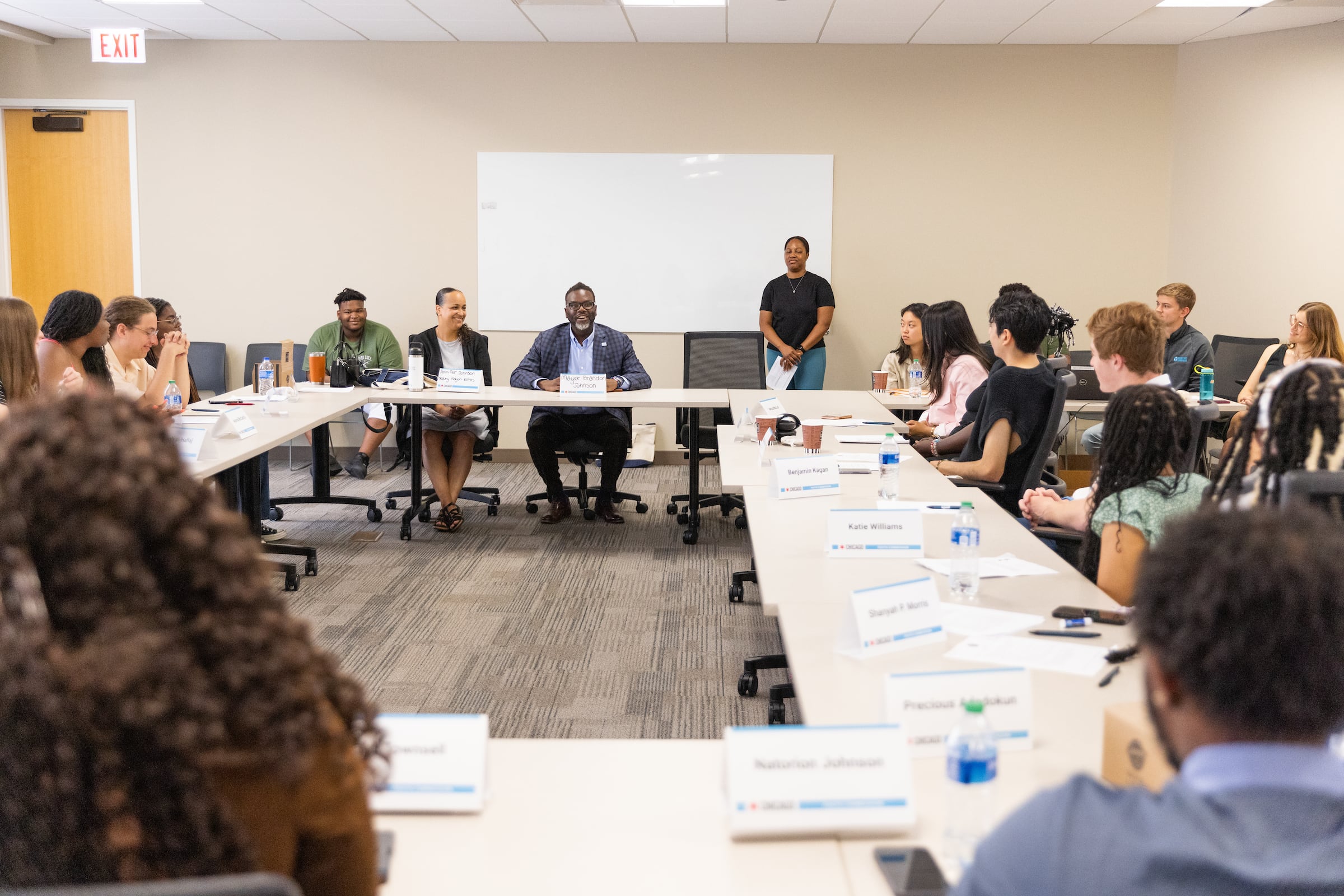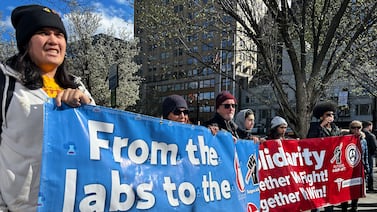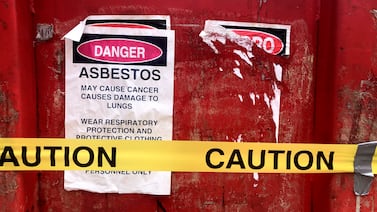In many places, young people are shut out of governmental decision-making. But in Chicago, a group of teenagers have a seat at the table, advising the mayor on issues ranging from public safety to neighborhood development.
The 32-member Mayor’s Youth Commission was started by former Mayor Lori Lightfoot in the fall of 2019 and became a formal advisory body before she ended her term. Mayor Brandon Johnson’s transition team recommended creating a youth department in the long-term.
Commission members, who range in ages from 14 to 19, can serve up to two years and meet at least once a month to discuss policy with city leaders and community groups. They receive a yearly stipend of up to $500.
This year, the commission released a New Ideas report, detailing project proposals from each working group — education, neighborhood development, public health, and public safety. The education working group recommended creating a database of postsecondary and employment resources. The group plans to implement this database into the city of Chicago’s My CHI My Future app.
Some members of the mayor’s youth commission ended their terms this August. With a new mayor in office and a new round of members joining the commission, Chalkbeat talked with the previous chair and vice chair of the working group centered on education.
These interviews have been lightly edited for length and clarity.
Debbie Mojekwu
Debbie Mojekwu, the education working group’s chair for 2022-23, ended her second term with the commission this month. She hails from the Beverly neighborhood, graduated from Jones College Prep earlier this year, and will be attending Yale University this fall.
What are some issues in the education system you feel motivated to change?
I’ve come across a lot of students who don’t have as much academic confidence as they should, and I feel like that’s mostly in minorities. It has to do with schools not having enough funding and just not as many resources.
I genuinely feel like if someone took these children and truly believed in them and showed that they believed in them through having adequate resources, having teachers, having counselors and more spaces for them to talk — if we had all these things across schools in Chicago, academic confidence wouldn’t be too much of an issue.
It’s never just the child, it’s also on the system.
What specifically made you want to choose the education working group?
I also had a lack of academic confidence throughout elementary school. I truly believed that my intelligence was tied to my skin color.
There was a time where I wouldn’t do any of my work, I just genuinely wouldn’t try at school because I didn’t see value in it. And I think also I had this sort of fear that if I tried and failed, then it would have confirmed my beliefs at the time.
Later on finally finding that academic confidence, I realized how powerful that could be. And I found that in representation, in my family and other Black leaders that I’ve seen in social media. I would say that that happened sophomore year of high school. So I feel like it took a long time to find that.
I began tutoring students with this program called Chicago Teen Mentors … I came across a lot of students that – you can hear it in just the language they use, that there’s some insecurity there, and hesitance, and fear of being wrong.
Being in that space, it kind of made me want to do more within education. These students primarily came from underfunded schools, and they were predominantly Hispanic and Black. And a part of me just felt, like, I wanted to change that.
What has your experience being chair of the education working group been like?
It’s genuinely been such a transformative experience. We’ve gotten to meet with so many community leaders, the mayor being one of them.
At the end of the day, I learned they’re just normal people. They have the same fears and anxieties that we all share. And they all have some common goal in bettering Chicago.
And working alongside the mayor’s youth commission — I see this group being some of Chicago’s greatest leaders. I’ve never met more educated people in my life than in the Mayor’s Youth Commission. And they made me want to learn more about the problems we have in our city and ways to change.
What’s next for you?
I’m going to Yale. I haven’t planned out all my extracurriculars, but I think I’m going to continue with hosting workshops for kids. I’m part of this program called Innoverge, we host STEM workshops. I am a molecular biology major, so I think a lot of my work will be with STEM.
I’ll probably find out more about New Haven, Connecticut and see what I want to help with there. One of the extracurriculars that interests me at Yale is you can work in a prison, and basically teach courses to prisoners who want to learn.
What is your advice for the next group of people on the education working group or on the Youth Commission in general?
I would say, just don’t be afraid to speak up. I feel like a large part of my first term, I never really spoke during our meetings and I didn’t speak during our roundtable discussion because I still had fears about public speaking. But when you’re in that space, no one judges you. Everyone values every single opinion, no matter how insignificant you think it may seem.
Also I would say, even though the meetings are once a month, you definitely should make this program a priority for you. I think when commissioners don’t really show up to meetings and they don’t really contribute to the work we’re doing, you’re also missing an opportunity. So I would say use this opportunity as best as you can, and stay on top of things.
Norah Al-Hallaj
Norah Al-Hallaj served as the vice chair of the education working group for the 2022-23 term. She will spend another year advising the mayor in her second term, though she does not yet know her title. Norah is from Bridgeport and is a senior at St. Ignatius College Prep.
What made you want to join the education working group?
Education has always been a big part of my life. I love to learn. And I’ve been pretty blessed – I attend private school and I have for all of my life. I know that the CPS system is not the greatest and there’s a lot of areas in Chicago where education is not as full as other places.
I wanted to be able to address that and look for solutions and work towards allowing people to have the same resources that I had. So it was more about extending the privileges I’ve had.
What work on the commission are you most proud of so far?
This was the first year we published the New Ideas booklet, and we recently were able to get a physical copy of it, and I felt such pride.
It’s one thing to talk in these meeting rooms about plans and hear everyone else’s ideas, but to see the whole commission come together and publish this was just a really cool process.
I read the New Ideas report and I saw the education working group released a push for more postsecondary resources. Can you tell me what brought you to want to focus on that?
We all kind of realized that a lot of resources exist, especially in a big city like Chicago. And what I mean by resources is internship programs, scholarship opportunities, testing for ACT/ SAT, Common App help, financial aid, that kind of thing.
And they exist, but the problem was they were so scattered – especially on the Internet – that students and parents who weren’t familiar with the process had a lot of trouble finding and accessing this plethora of resources. So we wanted to find a way to consolidate and create a detailed but very accessible platform for these resources.
What are your priorities for the next year?
My priority is definitely getting this platform for the resources up and running. I want to see that in the next couple months. And I also want to focus more on having town halls for youth voices.
I would love to see (a town hall) for the college application process. A lot of CPS students really freak out, because there’s so many kids in a lot of these schools – you become lost when it comes to getting help and getting your questions answered. So I would love to see town halls or panels and actual events where people can go and feel a lot more confident in themselves walking out.
What is the importance of having youth voices connected to the city government?
I’m 17, so I can’t vote. And I know plenty of people have very intelligent opinions and perspectives and ideas for city government, and how to make it more effective and better serving for underage individuals.
And the problem with that, is that we can’t vote. We can’t attend most city hall meetings that are held during the school day. And that is where I see the mayor’s youth commission come in, where we can go into our communities and round up these opinions and bring them to central government.
Max Lubbers is a reporting intern for Chalkbeat Chicago. Contact Max at mlubbers@chalkbeat.org.





